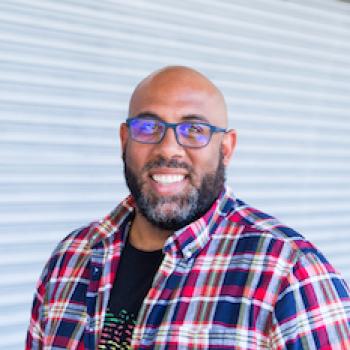This edition of The Forge explores racial capitalism. Black, Latinx, Asian, Pacific Islander, and Indigenous people collectively have had a proverbial boot on our neck since the “founding” of this country. Recent images of police murder and violence are graphic depictions of racist systems and institutions. This is to say nothing of the disproportionate number of coronavirus cases and deaths within communities of color. But deep inequalities were there long before the pandemic or the economic destruction left in its wake. All of our nation’s racial disparities have economic underpinnings. The confluence of our health crisis, our impending depression, and our upcoming election means that we cannot look away from the system of racial capitalism that brought us to this moment. As Arundhati Roy suggests, this pandemic is a portal moment, and we must ask ourselves: What are we taking into this next phase? Our answer: a Liberation Economy.
Yes, white supremacy is alive and well, and it will not end unless basic truths about our economy are recognized: that racism is profitable, that racism creates wealth for the elite, and that racism is to blame for the difficult economic conditions of people of color. The framework of racial capitalism captures this undeniable truth by exposing the ways that the economic systems of the United States have been racialized by design since their inception. Historic examples of racial capitalism include removing Native people from their land through theft and genocide; enslaving African people for worker and reproductive labor; and exploiting and underpaying immigrant laborers, whether it’s the Chinese railroad workers building the Transcontinental Railroad in the 1860s or the farmworkers from Mexico and Central America working the land. This historic economic foundation leads to what we, at Liberation in a Generation, call our current Oppression Economy — an economy that uses the racist tools of theft, exclusion, and exploitation to drive wealth to the elite while suppressing and vanquishing the economic well-being of people of color.
Racism is at the root of our economic problems
An economy that oppresses people of color must no longer be tolerated. We must focus on the root causes of our pain: racism and white supremacy. These root causes can be baked into the design of many economic or political systems, including socialism and communism. It is the profitability of racism that makes the U.S. brand of capitalism so cruel. The truth is, as Andrew Young, Martin Luther King, Jr., and Robert Reich have all said in some form, the U.S. economy has multiple systems at work: benevolent socialism for the wealthy and harsh capitalism for the rest of us. Our government has shown the capability to protect the economic well-being of its citizens. It has simply chosen not to for people of color. Before the pandemic, this administration passed a tax relief package that resulted in a windfall to corporations and an average boost to White families by $2,020. Black households, on the other hand, have only seen $840 dollars and LatinX households $970 from that $1.9 trillion bill. We continued to see exclusion carried out through the pandemic response. Undocumented immigrants and their families were excluded from Unemployment Insurance and direct stimulus payments, despite many being taxpayers.
Liberation Economy
We must find a path that is radical in its vision and practical in its strategic and tactical approach to winning transformative structural change. We should aim for an economy that is free from exclusion, exploitation, and theft. We envision what we call a Liberation Economy — an economy that provides for people’s basic needs, safety, and security, that adequately compensates people of color for their labor, and that provides a sense of belonging. It is a long way from where we are, but, by attuning to all the ways racism and capitalism intersect, we’ll be in the best position to effect bold policy changes to realize this Liberation Economy in a generation’s time. You can learn more about our vision for a Liberation Economy in this short explainer from Jeremie Greer.
As our friends at Groundwork Collaborative say, you are the economy. No matter what the economists say about increasing Gross Domestic Product (GDP), stock prices, corporate tax rates, or government regulation, your work, your purchases, your debts, and your savings are what fuel the vibrancy of the U.S. economy. It is the responsibility of our democratically-elected government, at all levels, to ensure that people of color receive our fair share of the wealth produced by the largest economy in human history. Our governments determine the rules by which our wealth is distributed or hoarded. That means that not only do your financial decisions have power, but your vote, your energy, your passion, your organizing, and your activism will create the power to shape our economic conditions and rules. Your ability to organize and mobilize in your community for bold, national change is the superpower we need to win liberation in a generation. .
What is in this edition?
You’ll find, first, a series of riveting audio articles featuring friends from across the fields of racial and economic justice speaking about how capital is generated, circulated, and traded in this economy — and what they believe defines racial capitalism.
The first segment focuses on land, land tenure, and homeownership as basic building blocks of racial capitalism. We hear from Chrystel Cornelius, Executive Director of Oweesta, to ground our understanding of land theft from Indigenous people as a basis for this country’s wealth. Cy Richardson of the National Urban League and Tara Raghuveer of People’s Action and KC Tenants then break down the racist history of housing policy and explain how we can fight for housing as a right.
Next up, an audio article exploring labor as capital, featuring Rebecca Dixon of the National Employment Law Project and Daniel Bustillo of the Healthcare Career Advancement Project of SEIU. They break down how our jobs remain highly segregated and how that decimates compensation and protections for workers of color.
Of course, money also makes money. We invited Maurice BP-Weeks of the Action Center on Race & the Economy and Robert Reich, former U.S. Labor Secretary and Director of Inequality Media, to talk about our dual financial system and the outsized power of Wall Street in the harmful financialization of our economic and political lives.
The written articles (and two interviews) in this edition feature stories of campaigns that have not traditionally been linked to the economic well-being of people of color but which demonstrate that fights for racial justice in any context must include an economic justice analysis. Check out the articles and the authors’ organizations.
-
-
Lawrence Grandpre of Leaders for a Beautiful Struggle illuminates how the legalization of cannabis should account for disproportionate racialized harm of the War on Drugs.
-
-
-
Raisa Johnson of BYP100 DC tells the timely story of fighting for decriminalizing sex work, especially for Black trans women.
-
-
-
Rodney Foxworth of Common Future gives his hot take on the role of philanthropy in ending racial capitalism.
-
-
-
Greisa Martinez Rosas of United We Dream, in an audio interview, makes the connection between our racialized immigration system and racial capitalism.
-
-
-
Danni Adams, Zaina Alsous, and Keirten Nivol from the Dream Defenders, in an audio interview, speak to why police and prison abolition will free all of us.
-
-
-
Bernadette Rabuy of the Prison Policy Initiative discusses how mass incarceration feeds racial capitalism and explores how COVID-19 could serve as an inflection point for a new path forward.
-
-
-
Briana Hammons of the Fines and Fees Justice Center rounds out our conversation on criminal justice with a look at local campaigns to end government-imposed discretionary fines and fees.
-
-
-
Maurice Mitchell of Working Families Party & Varshini Prakash of the Sunrise Movement team up to talk about the failings of the race-neutral approach of the environmental movement and how the Green New Deal is charting a new path for racial, economic, and environmental justice.
-
-
-
Maurice BP-Weeks of ACRE holds up Amazon as a case study in how corporate concentration perpetuates racial capitalism.
-
The theme throughout these pieces is that the path to achieving any progressive change runs through Black and Brown communities. Racial capitalism must be called out and met head on in our social and racial justice movements. Furthermore, there are plenty of Black and LatinX leaders and other leaders of color poised to co-create the path forward.
This edition contributes to our collective ability to make demands that are structural and remove the profit incentives for racism and white supremacy. It adds to our ability to create political strategies that hold our policymakers accountable for real change. If you’re not already, we hope this series gives you a reason to join a racial economic justice movement — whether it’s the Center for Popular Democracy, United We Dream, ACRE, BYP 100, People’s Action, NELP, SEIU, Dream Defenders, or any organization in your community working to release the stranglehold of racial capitalism.
Are you an organizer, interested in a Liberation in a Generation workshop or presentation to educate, activate, or motivate your community? Hit us up here. Want to add your thoughts on policies to end racial capitalism? Weigh in at LibGen.Consider.It. Want regular info and highlights from our partners? Sign up for our newsletter here.
Liberation in a Generation thanks Lindsay Zafir, Brian Kettenring, and Connie Razza for bringing this edition into fruition. Thank you to Nino Moschella for post-production audio, Alexis Meisels for editing support, and Carolina Agan for content management.
Artist’s Statement from Nettrice Gaskins: Sonification is the practice of mapping aspects of the data to produce sound signals. This time-based illustration demonstrates the sonification of unemployment data for each state. Software was used to turn the data into sounds and music. Additional software was used to create an animation that responds to the music. The process was used to create the 2D graphics for the magazine.

